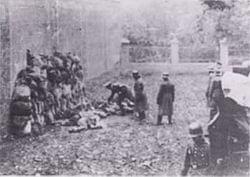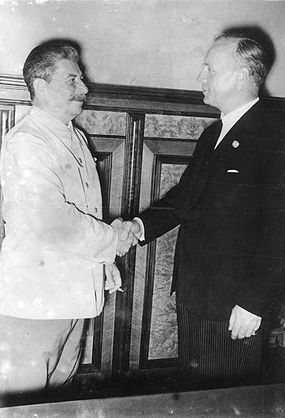Firstly, let me say that I did NOT call for any form of censorship - I hope that this, at least, is clear.
Every topic, no matter how emotive, should be discussed(although I doubt that any of us would appreciate a thread about, let's say, shaving one's nads...
). What I
DID say, however, was that in my humble opinion,purely one-sided pro-Nazi sentiment can drive potential members away from the site. That's all.
Kaptain Poop - Who here said that we all have to believe the "mainstream" view of history? All I did was point out that the Germans were not always innocent victims and that they dished out some horrible stuff in Eastern Europe. Does the fact that I raised German atrocities make me some kind of pro-Israel troll who "feigns concern" for the site? If You choose to believe that the Nazis were 100%blameless 100% of the time and that such a view is thedefining prerequisite of White Nationalism, that's fine, mate. But I prefer toperuse and acknowledgeall aspects of the pictureand, as far as I can see, this is not an NSDAP tribute site, so people can surely criticise aspects of Hitler's Germany - or isn't that allowed?
Anak - I do not think that Poleswere / areall innocents or in any way ideal. I must admit to deliberatelyposting a purely tendentious Polish point of view without, for instance,mentioning the Polish role in the 1938 dismemberment of Czechoslovakia (which You touched upon), in order to see how people would react
(I edited the post several times, in an attempt to attainthe requisite"imbalance"
).
I have no problem in acknowledging less-than-impressive episodes in Polish history, such as the abovementioned Czechoslovakian affair, anti-German violence in the inter-war period, Pilsudski's "pacifications" in the east, the 16th /17th century szlachta's short-sighted and repressive policies in the Ukraine and Poland itself, et cetera. That's precisely why the "white knight" school ofGerman Nazi-era history irritates me so much - "we were strictly honourable, never committed any wrongs", and so on. The NSDAP was a
German nationalist movement which put the interests of
Germans first (which is fair enough, if you're German) - it was
not a general "all whites are equal" White Nationalistmovement. I wish that people would stop portaying the Nazis as something else - namely, a messianic pan-White organisation. If anyone tells me that Hitlersaw Poles, Czechs and Russians as peers, well,that's just pure rot. The portion of Hitler's speech which You quoted, for example, refers to the Poles as "a much inferior people".Now, to the points / events that You discussed.
Your picture of occupied France propmpted me to make my initial post, as it showed only one side of German occupation. As You said Yourself, Poland was a separate issue (and much less pleasant one at that).
Both the Gleiwitz Incident and the Bromberg Massacre (and the events aroundthem) are, as You know, steeped in controversy - both sides, funnily enough, have their own version
. We must perforce look at the background of relations between ethnic Poles and Germans, especially in the areas of the old Prussian Partition and Pomerania, where the populations had been mixed for centuries.Bydgoszcz, forexample,came under Prussian rulein 1772, Poznanin 1793. The Polish populationsof theselands came underGerman control and were gradually subjected to Germanisation, especiallyin the second half of the 19th century, aseconomic competition between the two groups intensified with the rise ofthe Polish middle class. This alarmed the traditionally dominant Germans and, in the era of
Kulturkampf, state efforts of forced Germanisation, especially in schools,increased. You may or may not have heard about the strike staged by Polish schoolchildren in Wrzesnia in 1901-02 in response to beingbeaten for refusing to say the Lord's Prayer in German. This type of bitter sentiment was still present a mere thirty seven, thirtyeight years later - the Germans had been heavily dispossessed as a result of Versailles and were now the second-class citizens, while the Poles, who had finally regained independence and remembered past discrimination, did not wish for a return to the old order. The Poles were also displaying that unfortunate naive chauvinism which is often present in new / resurrected states, buoyed by their success in the Russo-Polish War of 1921. This success gave them a rather distorted confidence in their military "might", given the almost 19th century nature of that conflict. All in all, not exactly an atmosphere of trust and goodwill.
As You said, what Poland and Germany had was a border dispute. In my opinion, war was alwaysinevitable, despite the many negotiations, offers, counter-offers, and the like. The two peoples / nationssimply didn't trust each other. The Germans were keen to regain former territories, while the Poles wished to retain what they now had at all cost. If it didn't happen in 1939, it would have happened later - guaranteed.I assume that Polish leaders probably calculated that they stood a better chance at that point in time, as they would supposedly receive prompt aid from Franceand Britain, than when Germany was evenmore powerful in the future.
The German attempts to entice Poland to join the Anti-Comintern Pact must also be viewed in the light of the abovementioned climate of distrust, with Poland not wanting to be an obviouslylesser, subservient partner. Whether joining the Pact or permitting the construction of an extra-territorial highway and railroad through the Polish Corridor would have prevented war and eased tensions is, in my opinion, highly unlikely.The Polesfeared sharing the fate of Czechoslovakia (despite, ironically, participating in that country's "peaceful" destruction)if they made any concessions, while the Germans were in an increasinglystrong position and encouraged by their territorial gains to date.
I'm glad that You concluded by saying that all sides committed atrocities
- that's the kind of honesty which is sometimes lacking in discussions of the Second World War. What the world would look like in the event of a German victory is pure speculation - but, given the history of Polish-German relations in the era of the Partitions, I would not be inclined to share Your optimism about the fate of the Poles.
Anyway, enough of all this. As whites, we should be putting our differences aside and uniting against our true foes. The world has changed and we need to recognise those changes and realise that cooperation is the key to survival.
Despite what people may have inferred from these posts, I have nothing against the Germans. In fact, I tend to get on quite well with most of the Germans thatI meet. They, like all white people, are my people. I find it strange when old white ethnic rivalries are placed above racial rivalries. During the 1998 World Cup,I recall seeing some Scottish fans being asked whether they hoped that England wouldqualify for the second round. The response: "No, anyone but England!". Well, England's group consisted of Romania, Colombia, and Tunisia, so therefore these Scottish geezerswould happily see England (a much whiter team than the present incarnations, by the way) lose to a black and mestizo-laden Colombia and an Arab-laden Tunisia. Amazing...
By the way, sorry for the "late" edit - I was literally falling asleep at something like 2AM, so the post was not in the best shape and I had missed a couple of points.
Edited by: Rebajlo
















